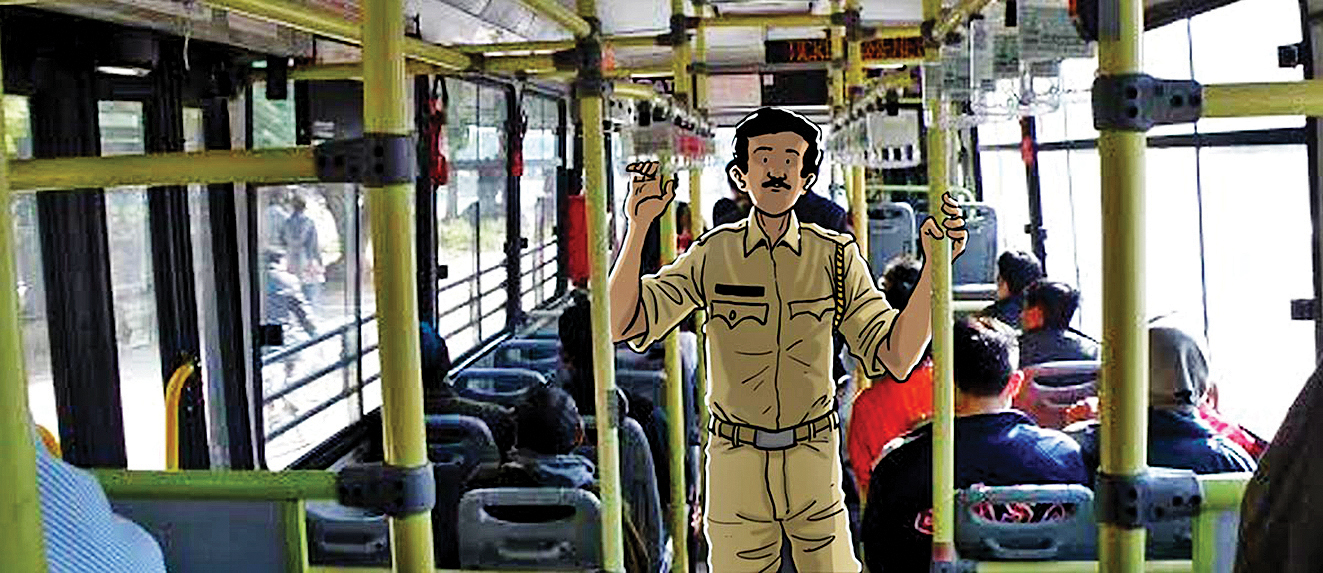How did the first day of Delhi’s new bus marshals go? From confusion and complaints to confidence, it was an eventful day
It’s Bhai Dooj on October 29, and a group of women and children stand at the Malviya Nagar bus terminal in Delhi, their faces lined with confusion. The women are taking their children to the International Dolls Museum in Bahadur Shah Zafar Marg, but they have no idea which bus will get them there.
One of them, Fatima Khan, asks a nearby driver what to do. As he directs them to Bus No 520, which travels to Super Bazaar in Connaught Place, they are greeted by some pleasant news: Women can now travel on buses for free. That’s not all: a total of 13,000 marshals will now travel on the buses with them to ensure their safety.
On Bus No 520, Ram Nath, 50, sits quietly towards the front, wearing a crisp khaki uniform with the word “Marshal” stamped on the sleeves. Scrutinising each passenger who gets in at every stop, Nath is confident his presence will change the way people travel.
Delhi has increased the number of bus marshals from 3,400 to 13,000 as part of Chief Minister Arvind Kejriwal’s push to improve women’s security in the city. Announcing the scheme, Kejriwal had said, “We are committed to boost the security of women in Delhi. And I don’t think the level at which we have increased the number of bus marshals, it has been done in any city in the world…Delhi is like one big family. And I am the elder son of this family. And, being the elder son, from tomorrow I am bearing the cost of commuting in DTC buses, of our sisters, mothers and daughters.”
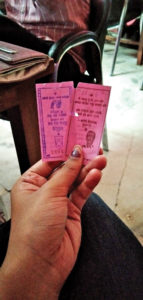
Nath is happy to have the work. A home guard with the Railways for nine years, he lost his job after a protest asking for salary hikes and better facilities. As a bus marshal, he’s on a daily wage system, working eight hours from 6 am for a wage of Rs 2,100. Though, as he pointed out, “We can be thrown out at any time as there is no job security as such.”
Nath may be confident about making women feel safer while travelling, but Bus No 520’s conductor, Ram Niwas, isn’t as optimistic.
“The problem is the attitude of people,” Niwas argued. “People don’t support or help us in managing those creating a ruckus. There might be pickpocketing or eve-teasing, and they’ll remain spectators. If we intervene and are attacked or threatened, people still remain silent. I’m happy 13,000 people have got employment, but I have no hope for change.”
Niwas has worked with the Delhi Transport Corporation for 34 years. He says some bus routes are “more problematic” than others. While Bus No 520 is fairly empty and, therefore, well-behaved, Bus Nos 469, 522, 739 and 717 are a different story. “These routes are really crowded and has maximum cases of pickpocketing and eve-teasing,” he said. “If you want to know what I’m talking about, travel in those buses.”
Newslaundry complied. This correspondent took Bus No 522 — which plies from Inderpuri to Ambedkar Nagar — at noon on October 29. The bus was not very crowded but that could be because it was Bhai Dooj. Its usual passengers, travelling to school, college and work, were missing since most establishments were shut. Instead, the bus was full of women in ornamented saris on their way to visit relatives. One of them, Rohini Singh, smiled when the conductor told her that bus rides were now free for women. “Chalo, yeh achha hai,” she said. (That’s good).
Asked if she was aware of the deployment of more bus marshals, Singh said, “Yes, I have seen men in uniform on the bus and read about it in the newspaper.”
Kanwar Lal Paliwal was the marshal assigned to Bus No 522. He said this was a “great initiative”. Like Nath, he used to work as a home guard. As a marshal, he gets a daily wage of Rs 725. “The wages differ according to your seniority,” he explained. “I’m confident I can manage [on the bus] if something happens. People ought to feel safer.” Both Nath and Paliwal said they didn’t receive any special training to serve as bus marshals.
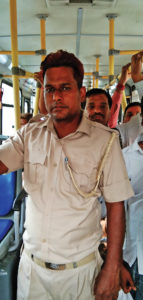
According to Vinod Kumar, driver of Bus No 522, if pickpocketing or eve-teasing is reported, “we stop the bus, take the accused person down, and dial 100”.
Kumar, who has worked with the DTC for six years, agreed that people’s apathy is a problem. “They don’t react quickly, they don’t make noise on time,” he complained, referring to passengers. If a female passenger faces eve-teasing, he advised, they “need to react immediately”. “If you’re quiet, they will continue doing what they do,” he added.
The deployment of marshals hasn’t gone entirely smooth. Bus No 183, plying from Inderpuri to Nizamuddin, was without a bus marshal on October 29. The conductor, Sunil Kumar, said it was because the marshal was “stuck in a traffic jam”. Flustered, Kumar telephoned his duty manager.
“My DM asked me to wait for 15-20 minutes,” Kumar said. “I waited and the marshal still didn’t come. If I had complained, he would have lost his job and it’s his first day! So, I didn’t do that. I just wrote in my register that he was late. If this happens every day, I might complain then.”
Kumar hoped the deployment of bus marshals instils “fear” among passengers. He recalled an incident from two days earlier on a bus to Gurugram. “A guy sat beside a girl even though there were empty seats in the bus. I could see him disturbing the girl. But look, I can’t do anything till she speaks out. What if I pull him out and she says he’s her friend? After a few minutes, she reacted and I slapped him immediately.”
He is of the view that the presence of a bus marshal will prevent young men from harassing women in the first place.
At Nizamuddin terminal, Bus No 183’s last stop, chaos reigned. Newly recruited marshals were trying to figure out which buses they were assigned to. Most of them were in their 20s and told Newslaundry that they received “basic defence training” for five days.
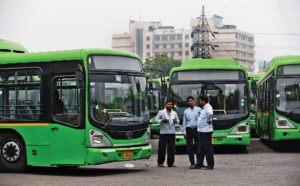
“I had been applying for defence jobs when I was called in for this,” said Arun Shehrawat, a 22-year-old newly-minted marshal. “We attended a five-day training programme on how to handle miscreants and learned basic defence techniques near India Gate.”
Shehrawat, who worked for Amazon earlier, receives a daily wage of Rs 688 as a marshal. “I’m nervous as well as excited,” he confessed, “but I am confident I will do my work properly.”
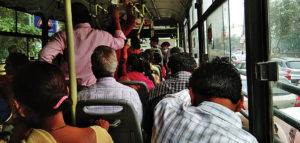
Around him, confusion reigned. One marshal was arguing with a man handing out duty slips, telling him the slip said Bus No 44 instead of 46. Nearby, another marshal lost his patience because he hadn’t been handed a duty slip yet. But, as conductor Sunil Kumar said, it’s only their first day. “Things will get organised eventually.”
www.newslaundry.com

